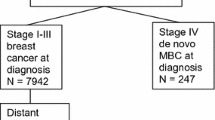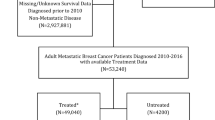Abstract
Purpose
We hypothesized different Overall Survival (OS) in metastatic breast cancer (MBC) after relapse vs de novo presentation.
Methods
We identified women in British Columbia with MBC diagnosed between 01/2001 and 12/2009. OS from MBC was calculated for relapsed vs de novo cohorts in 3 subgroups, based on hormone receptors (HR) and HER2 status. Age at MBC, disease-free interval (DFI), de novo vs relapsed, year of MBC diagnosis, and systemic treatment were entered into univariable and multivariable analyses.
Results
We identified 3645 pts with known HR of which 2796 had known HER2. Median follow-up was 91 months. Median OS was longer for de novo vs relapsed MBC: HR+/HER2- 34 versus 23 months (mos) (p < 0.0001), HR−/HER2- (TN) 11 versus 8 mos (p = 0.02), HER2+ 29 versus 15 mos (p < 0.0001). For TN disease, no variable independently discriminated a group with increased risk of death. For both the HR +/HER2- and the HER2 + groups, relapsed vs de novo status (HzR 1.4 [95% CI 1.2–1.5; p < 0.0001], and HzR 1.6 [95% CI 1.4–1.9; p < 0.0001], respectively) and age >50 (HzR 1.2 [95% CI 1.1–1.4; p = 0.001] and HzR 1.3 [95% CI 1.1–1.5; p = 0.01], respectively) were associated with increased risk of death on multivariable analysis.
Conclusion
These data provide information that may guide discussions about prognosis between physicians and patients with MBC. In addition, it highlights the importance of stratifying for initial stage at diagnosis in future MBC therapeutic trials.


Similar content being viewed by others
References
Miller K, Sledge G (1999) The role of chemotherapy for metastatic breast cancer. Hematol Oncol Clin North Am 13(2):416–443
Sant M, Allemani C et al (2004) Breast carcinoma survival in Europe and the United States. Cancer 100(4):715–722
Early Breast Cancer Trialists’ Collaborative Group (2005) (EBCTCG): effects of chemotherapy and hormonal therapy for early breast cancer on recurrence and 15-year survival: An overview of the randomised trials. Lancet 365(9472):1687–1717
Metzger-Filho O et al (2013) Patterns of recurrence and outcome according to breast cancer subtypes in lymph node-negative disease: results from the international breast cancer study group trials VIII and IX. J Clin Onc 31(25):3083–3090
Kennecke H, Yerushalmi R, Woods R et al (2010) Metastatic behavior of breast cancer subtypes. J Clin Oncol 28:3271–3277
The Cancer Genome Atlas Network (2012) Comprehensive molecular portraits of human breast tumours. Nature 490:61–70
Bedard PL, Hansen AR et al (2013) Tumour heterogeneity in the clinic. Nature 501:355–364
Polyak K (2011) Heterogeneity in breast cancer. J Clin Inv 121(10):3786–3788
Dawood S, Broglio K et al (2010) Survival differences among women with de novo stage IV and relapsed breast cancer. Ann Onc 21:2169–2174
Yardley D, Kaufman P et al (2014) Treatment patterns and clinical outcomes for patients with de novo versus recurrent HER2-positive metastatic breast cancer. Breast Cancer Res Treat 145:725–734
Lohrisch C, Speers C, et al. Impact of adjuvant trastuzumab (AT) on survival in metastatic (M1) her2 positive breast cancer. Accepted for poster presentation at San Antonio Breast Cancer Symposium (abstract 1557) Dec 2013
Rossi V, Nole F et al (2014) Clinical outcome in women with HER2-positive de novo or recurring stage IV breast cancer receiving trastuzumab-based therapy. Breast 23(1):44–49
Singletary SE, Allred C et al (2002) Revision of the American Joint Committee on cancer staging system for breast cancer. J Clin Onc 20(17):3628–3636
Schemper Michael, Smith Terry L (1996) A note on quantifying follow-up in studies of failure time. Control Clin Trials 17(4):343–346
Shah SP et al (2009) Mutational evolution in a lobular breast tumour profiled at single nucleotide resolution. Nature 461:809–813
Aparicio S, Caldas C (2013) The implications of clonal genome evolution for cancer medicine. N Engl J Med 368:842–851
Gerlinger M, Rowan AJ et al (2012) Intratumor heterogeneity and branched evolution revealed by multiregion sequencing. N Engl J Med 366:883–892
Greenberg PA, Hortobagyi GN et al (1996) Long-term follow-up of patients with complete remission following combination chemotherapy for metastatic breast cancer. J Clin Oncol 14(8):2197–2205
Gennari A, PierFranco C et al (2005) Survival of metastatic breast carcinoma patients over a 20-year period. Cancer 104(8):1742–1750
Lebbezoo DJA, van Kampen RJW et al (2015) Prognosis of metastatic breast cancer: are there differences between patients with de novo and recurrent metastatic breast cancer? BMJ 112:1445–1451
Dent R, Trudeau M et al (2007) Triple-negative breast cancer: clinical features and patterns of recurrence. Clin Cancer Res 13(15):4429–4434
Shah SP, Roth A, Goya R et al (2012) The clonal and mutational evolution spectrum of primary triple-negative breast cancers. Nature 486:395–399
Dent R, Hanna WM, Trudeau M et al (2009) Pattern of metastatic spread in triple-negative breast cancer. Breast Cancer Res Treat 115:423–428
Amir E, Miller N et al (2012) Prospective study evaluating the impact of tissue confirmation of metastatic disease in patients with breast cancer. J Clin Oncol 30:587–592
Chia S (2012) Testing for discordance at metastatic relapse: does it matter? J Clin Oncol 30(6):575–576
Swain SM, Baselga J et al (2015) Pertuzumab, Trastuzumab, and Docetaxel in HER2-positive Metastatic Breast Cancer. N Eng J Med 372:724–734
Verma S, Miles D, Gianni L et al (2012) Trastuzumab emtansine for HER2-positive advanced breast cancer. N Engl J Med 367:1783–1791
Slamon DJ, Leyland-Jones B et al (2001) Use of chemotherapy plus a monoclonal antibody against HER2 for metastatic breast cancer that overexpresses HER2. N Engl J Med 344:783–792
Baselga J (2001) Herceptin alone or in combination with chemotherapy in the treatment of HER2-positive metastatic breast cancer: pivotal trials. Oncology 61(Suppl 2):14–21
Tripathy D, Kaufman PA et al (2013) First-line treatment patterns and clinical outcomes in patients with HER2-positive and hormone receptor-positive metastatic breast cancer from registHER. Oncologist 18:501–510
Author contributions
WdB and CL had full access to all of the data in the study and took responsibility for the integrity of the data and the accuracy of the data analysis. WdB, CS, EB, and CL were involved in extraction of the data. LG performed statistical analysis. All authors contributed to the writing of the manuscript and agreed to submit the article for publication.
Funding
No funding was received for this retrospective study.
Author information
Authors and Affiliations
Corresponding author
Ethics declarations
Conflict of interest
Authors WdB, CS, LG, EB and CL declare that they have no conflicts of interest. ST has acted in a consultant/advisory role for Amgen, the makers of Denosumab.
Ethical approval
This article does not contain any studies with human participants or animals performed by any of the authors. Institutional research ethics board approval was obtained for this retrospective review of anonymized electronic records.
Electronic supplementary material
Below is the link to the electronic supplementary material.
Rights and permissions
About this article
Cite this article
den Brok, W.D., Speers, C.H., Gondara, L. et al. Survival with metastatic breast cancer based on initial presentation, de novo versus relapsed. Breast Cancer Res Treat 161, 549–556 (2017). https://doi.org/10.1007/s10549-016-4080-9
Received:
Accepted:
Published:
Issue Date:
DOI: https://doi.org/10.1007/s10549-016-4080-9




